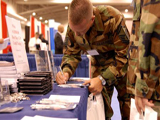Survey Reports Skilled Veterans Can Shoot Missiles, But Not Resumes
Post Views 1
Employers, who have hired them, are full of praises for them and an overwhelming number of them say that they are very happy to have hired them. Ninety-nine percent of employers who have hired veterans say they did their jobs as well or better than civilian counterparts, and 99 percent say they would happily recommend hiring a veteran.
To find out exactly what the problem was Monster.com and Military.com, the former the world’s largest job-search site, and the latter its subsidiary, surveyed 900 employers and more than 900 returning veterans.
Their results, released Wednesday in their second, semiannual Veterans Talent Index (VTI), found that both the veterans and the employers feel that even though the vets are competent and prepared to do civilian jobs, they do not know how to get those jobs.
“There’s a communication gap here,” says T.L. McCreary, president of Military.com. “It seems like the veteran and the employer talking past each other, at times.”
The survey found that for the veterans, for whom death-defying antics on the battle field were easy, it was a huge challenge when it came to writing resumes, giving job interviews and other job-search communications.
The first obstacle that they need to overcome is that they must speak with less military slang.
For example a Navy Fire control man, manages and operates a ship’s weapons systems and fires its missiles. It requires for a lot of technical expertise and an advanced knowledge of operating, maintaining, and repairing sophisticated microcomputers, something sorely missing among the country’s available job force.
However, if his resume, failed to convey this message adequately, he would probably not get an interview let alone a job.
Jason Hansman, membership director for the nonprofit Iraq and Afghanistan Veterans of America said, There’s misunderstanding on both sides of the aisle. When less than one percent of the population has served, it’s hard for the other 99 percent to relate to their experience and then be like: ‘Yes, this person can help my bottom line.’ ”
This is a serious problem that needs to be addressed and this gap has to be abridged. According to the Bureau of Labor Statistics, the veterans have a higher rate of unemployment, when compared to the non-veterans. Moreover, over a million veterans are expected to return to civilian life in the next five years.
The survey shows that veterans are also fairly confident that they have the requisite qualifications and competence to make a fruitful contribution to their civilian careers. But they feel that they may not be able to get the jobs that they want. Only 29 percent said that they were confident that they would get work of their choice and appropriate to their qualifications.
Amongst President Obama’s priorities, is framing a Veteran Jobs Corps., and ensuring that it becomes law. The legislation would help Iraq and Afghanistan veterans get jobs as police officers, firefighters, and otherwise serving their communities.
“Most of what we see the transition assistance program doing is training people how to get out — not how to get ahead,” says Mr. McCreary, himself a retired Navy rear admiral. “The military spends billions of dollars a year on training; it wouldn’t hurt for them to train people for this transition to the level they train you for everything else.”
Survey Reports Skilled Veterans Can Shoot Missiles, But Not Resumes by Harrison Barnes


 Top 10 Tips for How to Cope Financially After a Layoff
Top 10 Tips for How to Cope Financially After a Layoff  How to Cope With Losing a Job
How to Cope With Losing a Job  5 Steps to Take after Getting Laid Off
5 Steps to Take after Getting Laid Off  How to Explain Being Fired
How to Explain Being Fired  How to Feel If You Keep Losing Jobs
How to Feel If You Keep Losing Jobs  How to Job Search When Already Employed
How to Job Search When Already Employed  The Bright Side of Unemployment
The Bright Side of Unemployment